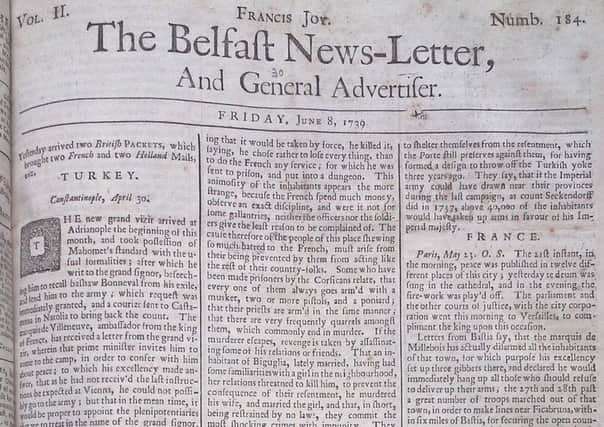Reported 280 Years Ago (June 19 1739): Corsicans who killed a French officer are to be executed on a wheel


CORSICA. Bastia, May 12.
A French man of war has taken near Cape Corse two barks, laden with arms and ammunition for the Corsicans.
The officer that was lately assassinated in his bed, was the major of the regiment of Auvergne.
Advertisement
Hide AdAdvertisement
Hide AdTwo Corsicans who committed this action having been arrested the marquess de Maillebois is determined to have them broke upon the wheel, to intimidate the inhabitants of this place, which a numerous garrison does in no sort hinder from shewing on all occasions their hatred of the French; of which the following story is a proof: the day that the marquis de Maillebois arrived here, a captain being commanded to meet him, and wanting a horse, gave orders to hire one at any price: one of the inhabitants being applied to for that purpose, insolently refused to lend his horse; and perceiving that it would be taken by force, he killed it, saying, that he chose rather to lose every thing, than to do the French any service; for which he was sent to prison, and put into a dungeon.
This animosity of the inhabitants appears the more strange, because the French spend much money, observe an exact discipline, and were it not for some gallantries, neither the officers nor the soldiers give the least reason to be complained of.
The cause therefore of the people of this place shewing so much hatred to the French, must arise from their being prevented by them from acting like the rest of their country-folks.
Some who have been made prisoners by the Corsicans relate, that every one of them always goes arm’d with a musket, two or more pistols, and a poniard; that their priests are arm’d in the same manner; that there are very frequently quarrels amongst them, which commonly end in murder.
Advertisement
Hide AdAdvertisement
Hide AdIf the murderer escapes, revenge is taken by assassinating some of his relations or friends.
That an inhabitant of Biguglia, lately married, having had some familiarities with a girl in the neighbourhood, her relations threatened to kill him, to prevent the consequence of their resentment, he murdered his wife, and married the girl, and that, in short, being restrained by no laws, they commit the most shocking crimes with impunity.
They write from Calvi, that two French officers going home one night were stabb’d in several places with poniards, and were at the same time told by them who did it, that in that manner they treated people who cut down their olive-trees, alluding to those cut down near Monte-Maggiore.
The marquis de Maillebois is already weary of being in this island; he finds that it must either be abandoned, or that by means of a powerful army, it must be entirely destroyed.
Advertisement
Hide AdAdvertisement
Hide Ad[Corsican rebels were seeking independence from Genoa, with France helping the latter. The Marquess de Maillebois was the French general. A peace deal failed. Corsica would later become French, and in 1769 Napoleon would be born there]
FRANCE. Paris, May 23. O.S.
Letters from Bastia say, that the marquis de Mallebois has actually disarmed all the inhabitants of that town, for which purpose his excellency set up three gibbets there, and declared he would immediately hang up all those who should refuse to deliver up their arms; the 27th and 28th past a great number of troops marched out of that town, in order to make lines near Ficabruna, within six miles of Bastia, for securing the open country from the insults of the malecontents; that in all appearance the campaign will be opened in the province of Balagna, to the end that the communication between Bastia and Calvi may be restored; and that the malecontents have spread a report that Corsica is to be ceded to the infant Don Philip, in consequence of the marriage with the eldest madame of France.
[Letters from Paris say] that the [Ottoman] Porte has ordered her troops to ravage the Ukrain, in order to oblige the Russian army to seek for subsistence elsewhere; and that they have discover’d at Petersburg, that a treaty is negociating at Constantinople between the grand signior and a certain northern power. We shall probably soon hear of a triple alliance concluded at Constantinople, between a Popish a Protestant and a Mahometan power; for if France had no intention to disturb the tranquility of the north, there would be no occasion for exercising her marine in the Baltick.
TURKEY,
Constantinople, April 30.
The new grand vizir arrived at Adrianople the beginning of this month, and took possession of Mahomet’s standard with the usual formalities; after which he writ to the grand signor, beseeching him to recall the bashaw Bonneval from his exile, and send him to the army; which request was immediately granted, and a courier sent to Castamona in Natolia to bring back the count.
Advertisement
Hide AdAdvertisement
Hide AdThe marquis de Villeneuve, ambassador from the king of France, has received a letter from the grand vizir, wherein that prime minister invites him to come to the camp, in order to confer with him about peace; to which his excellency made answer, that as he had not receiv’d the last instructions he expected at Vienna, he could not possibly go to the army; but that in the mean time, it would be proper to appoint the plenipotentiaries that are to treat in the name of the grand signor.
The Dragoman, or grand vizir’s interpreter, has given the ambassador to understand, that if should propose a suspension of arms, there was room to believe it would be granted.
We don’t yet know whether Russia is included in this negociation.
Our last letters from Smyrna confirm the defeat of Sare-Bey-Oglou.